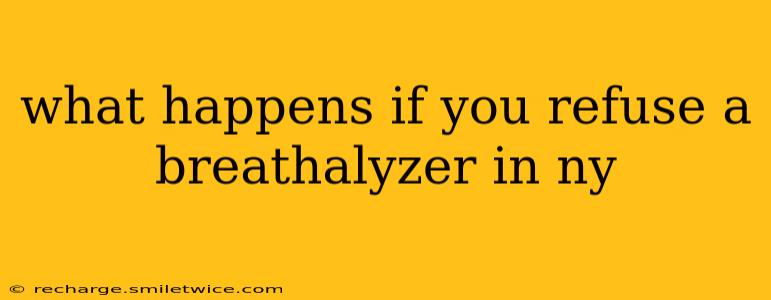What Happens if You Refuse a Breathalyzer in NY?
Refusing a breathalyzer test in New York can have serious legal consequences. While it might seem like a way to avoid incriminating yourself, the repercussions often outweigh the perceived benefits. This article will explore the potential outcomes of refusing a breathalyzer test in New York, answering common questions surrounding this crucial decision.
Understanding Implied Consent
In New York, like most states, you're subject to the "implied consent" law. This means that by driving a vehicle on public roads, you implicitly agree to submit to chemical tests (breathalyzer, blood, or urine) for alcohol or drug content if a law enforcement officer has probable cause to believe you're driving under the influence (DUI). Refusal is not a right, but rather, a choice with significant consequences.
What are the penalties for refusing a breathalyzer test in NY?
Refusal to take a breathalyzer test in New York State will almost certainly lead to the suspension of your driver's license. The length of the suspension depends on several factors, but it's generally longer than the suspension for a positive BAC (Blood Alcohol Content) test. This suspension is automatic and separate from any penalties resulting from a DUI conviction.
-
First Offense: A one-year license revocation is common.
-
Second Offense: The revocation period increases significantly, potentially to several years. Multiple offenses can lead to even longer revocations or permanent loss of driving privileges.
Can refusing a breathalyzer lead to a DUI conviction?
While refusing a breathalyzer test doesn't automatically mean a DUI conviction, it significantly weakens your defense. The prosecution can use your refusal as evidence against you, indicating a consciousness of guilt. Other evidence like erratic driving, field sobriety test performance, and officer testimony can still lead to a DUI conviction even without a confirmed BAC.
What evidence can be used against you if you refuse a breathalyzer?
The prosecution will likely present the following evidence in court:
- Your refusal to comply with the officer's request. This is a strong piece of evidence demonstrating your reluctance to cooperate.
- Observations from the arresting officer. Details of your driving behavior, appearance, speech, and any field sobriety tests performed will be documented.
- Witness testimony. If anyone witnessed your erratic driving or observed your behavior before or after the arrest, their testimony can be powerful.
Can I get my license back early after refusing a breathalyzer?
Possibly, but it's a complex process and far from guaranteed. You may be able to apply for a restricted license after serving a portion of your suspension, but this is usually granted only under specific circumstances and often requires a hearing and demonstrating a compelling need to drive (e.g., work, medical reasons).
What should I do if I'm pulled over and suspected of DUI?
This is a delicate situation requiring careful consideration. Your best course of action is to politely cooperate with the officer, but you have the right to remain silent and you should not take any field sobriety tests if you are not fully confident in your ability to perform them effectively. It’s crucial to consult with a qualified attorney immediately after your arrest.
Should I always refuse a breathalyzer?
No. Refusal has significant legal ramifications. This decision requires careful consideration of the facts of your case and the advice of a skilled attorney. The potential consequences of refusing are often severe, and in many cases, taking the breathalyzer test and having your lawyer address the BAC is a preferable strategy.
Disclaimer: This information is intended for educational purposes only and does not constitute legal advice. If you are facing DUI charges, you must consult with a qualified attorney in New York to discuss your specific situation and legal options. The penalties and procedures described here are subject to change based on new legislation or court rulings.
